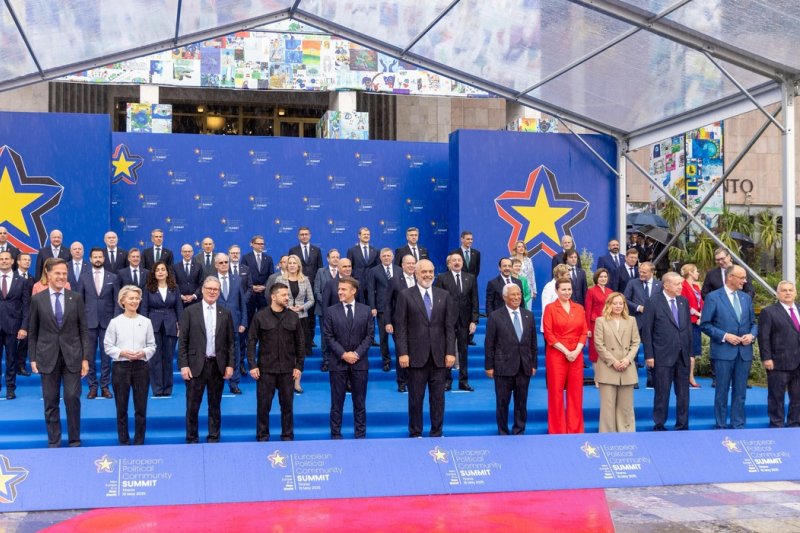The Month of Edi Rama
May of this year was undoubtedly the month of Albanian Prime Minister Edi Rama, whose mandate was reconfirmed with a convincing victory for the Socialist Party in the parliamentary elections of May 11. And not only that—Albania also successfully hosted the summit of the European Political Community, during which it received strong support for its path toward European Union membership. In fact, this support exceeded all expectations. While projections have pointed to Albania joining the EU by 2030, French President Emmanuel Macron suggested that membership could come as early as 2027.
With a solid victory in the latest parliamentary elections, Edi Rama now has the mandate to lead Albania to the conclusion of its long journey toward European integration.
Rama is a charismatic politician, though he is often said to exhibit authoritarian tendencies. The Democratic Party, led by pluralism veteran Sali Berisha, lost some of the mandates it held in the previous legislature amid accusations of irregularities in the May 11 elections. However, Edi Rama cannot be blamed for the Democratic Party’s loss. That party must seriously reconsider its leadership if it hopes to return to Albania’s political scene after four years. It squandered the past four years instead of reforming itself, facing repeated internal divisions and a persistent leadership crisis.
Sali Berisha, who remains an iconic figure in Albanian politics, has run out of time. The Democratic Party needs a new, charismatic leader capable of challenging Edi Rama, who has now been reconfirmed for a fourth time by Albanian voters.
Edi Rama has led the Albanian government since 2012 and has successfully guided the Socialist Party through four consecutive electoral victories. However, Albania continues to face a number of serious problems that Rama’s government must address in the coming four years. While the country has made notable progress in the fight against corruption—particularly through judicial vetting and the establishment of SPAK—organized crime, human trafficking and modern slavery, illegal migration, and drug trafficking remain pressing issues that both government and society must confront if EU membership is to be realized.
SPAK appears to be functioning effectively in combating high-level corruption. Over the past year, it has arrested both political opponents and allies of Edi Rama. Among those detained are former president and prime minister Ilir Meta, as well as the current mayor of Tirana and close Rama ally, Erion Veliaj. This suggests that SPAK is operating independently and is not merely a tool for Rama to settle political scores. Of course, the fight against corruption is long-term and never-ending. For it to succeed, it requires strong foundations and leadership from truly independent law enforcement institutions.
For years, law enforcement institutions have been among the main dysfunctions in the Albanian state. Rama’s government, albeit belatedly, has taken steps to cleanse these institutions of criminal and corrupt elements. For instance, at the end of last year and into early this year, all Albanian police directors, including the highest-ranking ones, were dismissed in an effort to restore public trust in the state police. This drastic measure followed revelations that many directors were active collaborators with organized crime. Some were directly linked to criminal networks through the encrypted “SKY ECC” app. Several Albanian police officers had even participated in organized crime operations, including the elimination of rival gangs.
Undoubtedly, these efforts to reform and strengthen law enforcement, alongside domestic reforms and active diplomacy, are improving Albania’s image. This, in turn, is benefiting the country’s most powerful economic sector—tourism. In recent years, Albania has made significant capital investments in road infrastructure and airports, improving access to the sought-after destinations along the Adriatic and Ionian coasts for both regional and international visitors. Albania is quickly becoming a desirable tourist destination, which will likely have a positive impact on the growth of other economic sectors, including services and manufacturing.
One of Edi Rama’s most distinctive features has been his active diplomatic engagement, which has elevated Albania’s standing in the Western Balkans. His approach to Serbia, though controversial, has yielded international benefits by casting Albania as a factor of stability and peace in a turbulent region. Still, his efforts to pacify Serbia—widely considered the primary destabilizing actor in the Balkans—through rapprochement and open-border policies have not produced the results he may have hoped for. Serbia’s aspirations for a Greater Serbia remain alive. Its ambitions in Bosnia-Herzegovina and Kosovo, its increasing tensions with Croatia, and its close ties with Russia make it an unreliable partner. Rama likely recognized this reality when he recently declared the Open Balkans project dead.
Edi Rama’s month marks the beginning of a significant new chapter for Albania under his leadership. In the next four years, he will remain the country’s undisputed leader, navigating both golden opportunities and enduring challenges. He must seriously tackle institutional and economic reforms, combat organized crime, address the production and trafficking of drugs and people, and expand economic opportunities to underdeveloped rural areas—all in an effort to stem the rising tide of illegal emigration to Western Europe.
Albania is entering a crucial phase in its transformation from a post-communist state plagued by political and institutional instability to a regional leader in the Western Balkans and a frontrunner in the European integration process.
In these next four years, Edi Rama will face the greatest challenge of his political career: to convert electoral legitimacy and diplomatic capital into deep and sustainable reforms that enhance the functionality of the Albanian state and bring it closer to the EU.
His success will no longer be measured by electoral landslides or international accolades but by tangible results: curbing corruption, reducing emigration, developing the economies of marginalized areas, and building strong, independent institutions. If he fails on these fronts, he will not only squander a historic opportunity but also extinguish the hope that many Albanians have placed in him—and in the country’s European future. / Koha Ditore













